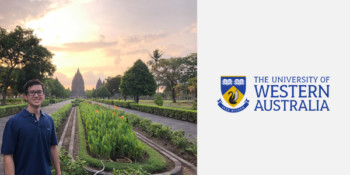Jonathan Darmago is a New Colombo Plan Mobility Grant recipient from the University of Western Australia. Jonathan undertook the Public Health Study Tour in November 2019.
Q: Why did you decide to undertake the ACICIS’ Public Health study Tour?
I decided to undertake the ACICIS Public Health Study Tour program to learn about the health system in
Indonesia. I also hoped to engage with the intriguing culture and have new experiences.
Q: Did you receive a New Colombo Plan Mobility Grant? If so, how did this contribute to your experience in Indonesia?
Yes, I did receive a New Colombo Plan Mobility Grant. It was a great help with funding and I am very
grateful that it afforded me the opportunity to go on this trip.
Q: What did you find to be the most challenging about your experience on the PHST?
One of the greatest challenges on this trip was the language barrier between myself and the locals. The
language classes that we attended definitely helped with basic questions and phrases, and throughout the
course of the tour I picked up more words which I could use in an everyday manner – such as ordering
food from restaurants and shopping at the supermarket!
Q: What public health issues in Indonesia have you become more interested in/aware of as a result of this tour?
From this tour, I am more interested in dengue fever (mode of transmission, degrees of clinical
manifestations, levels of prevention) and the method in which the World Mosquito Program combats it
using Wolbachia technology.
Q: What was your favourite field trip?
My favourite field trip was the public hospital visit as it was a real-life application of the public health that
we had been learning about in the seminar series. It also provided an insight into the different types and
treatments of communicable and non-communicable diseases that were present in Indonesia.
Q: How do you think the Public Health Study Tour will influence your future career or studies?
The Public Health Study Tour was very eye-opening for me as it provided an insight into how healthcare
can be adapted and delivered to best serve different environments and patient demographics, which could
be relevant to rural and remote communities in Australia.
Q: What did you most enjoy about the seminar series?
Having seminars delivered by speakers coming from a variety of different universities and hospitals
provided a broad scope of perspectives on the public health in Indonesia.
Q: What was your favourite aspect about visiting Indonesia?
My favourite aspect about visiting Indonesia was the kindness of the locals. Wherever we went we were
always greeted with a smile, and they were always quick to help with any questions that we had.


